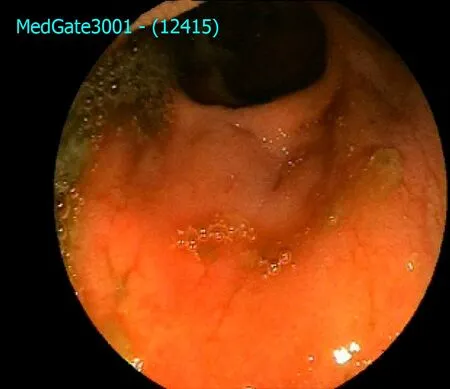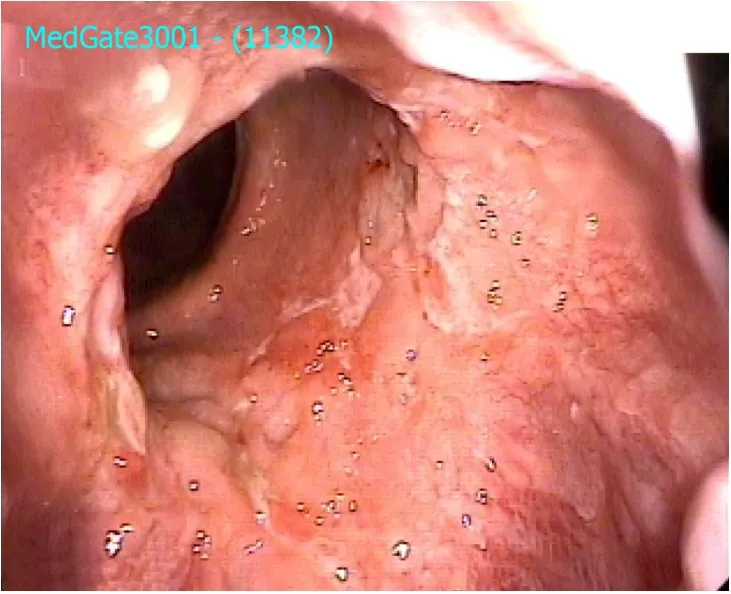Effectiveness of vedolizumab treatment in two different anti-tumor necrosis factor alpha refractory pouchitis:A case report
Ozlem Ozer Cakir
Abstract
Key words: Anti-tumor necrosis factor alpha; Refractory pouchitis; Vedolizumab;Ulcerative colitis
INTRODUCTION
Refractory pouchitis is a common cause of pouch failure, which may require surgical excision of the pouch or permanent diversion.Vedolizumab, a humanized immunoglobulin G1 monoclonal antibody to α4β7 integrin, has been shown to moderate gut lymphocyte trafficking with an efficacy in treatment of both Crohn's disease and ulcerative colitis (UC)[1,2].Although tumor necrosis factor-alpha (TNF-α)inhibitors have been reported to be effective as treatment for pouchitis[3], there is little data regarding the use of vedolizumab in refractory pouchitis[4].The effect of vedolizumab treatment on chronic antibiotic refractory pouchitis is very limited.Chronic antibiotic refractory pouchitis is a challenging complication in patients with UC who undergo proctocolectomy with ileal pouch-anal anastomosis.Chronic antibiotic refractory pouchitis occurs when patients do not respond to a 2-wk course of ciprofloxacin, metronidazole or rifaximin for pouchitis[5].
CASE PRESENTATION
Chief complaints
We report on a 32-year-old male with pancolonic UC.
History of present illness
A 32-year-old male with pancolonic UC since the age of 25 with primary failure of infliximab and mesalamine and intolerance of azathioprine, underwent a total proctocolectomy with ileal pouch-anal anastomosis in 2012.
History of past illness
He developed chronic diarrhea in 2014, which was watery, 30 per day and accompanied with blood and mucus affecting his quality of life.He could not work.He lost a lot of weight.He had fallen from 55 kg to 43 kg during pouchitis.His body mass index was 15.2 kg/m2.He used meselamine 3 g orally, steroid intermittently,lavman and loperamide orally three times daily.
Personal and family history
His family history was unremarkable.
Physical examination upon admission
His abdominal physical examination was normal.
Laboratory examinations
Laboratory work-up revealed erythrocyte sedimentation rate of 56 mm/h and Creactive protein of 3.6 mg/dL with no liver function abnormalities.Autoimmune markers including IgG4, anti-nuclear antibody and anti-mitochondrial antibody were negative.His blood tests for hepatitis B virus, hepatitis C virus, and human immunodeficiency virus antibodies were negative.Stool studies forClostridium difficile, viruses and bacteria were negative.Blood tests for Epstein-Barr virus and cytomegalovirus antibodies were negative.
Imaging examinations
An ileoscopy and pouchoscopy were performed that demonstrated normal proximal ileal mucosa, but there were diffuse edema, erythema and nodularity and multiple superficial and deep ulcers in the pouch.His pouchitis disease activity index score was 16.Biopsies obtained were negative for cytomegalovirus.An upper endoscopy was done at the same time to evaluate diarrhea, and it was normal.Duodenal biopsy was negative for the presence of celiac disease.Serum antibodies for celiac disease including anti-gliadin antibodies, endomysial antibodies and anti-transglutaminase antibodies were negative.Therefore, gluten restricted diet was not given to the patient.His chest X-ray was normal.Purified protein derivative skin test was 0 mm.
FINAL DIAGNOSIS
Chronic pouchitis.
TREATMENT
He was prescribed metronidazole 500 mg orally three times daily and ciprofloxacin 500 mg orally two times daily.But his symptoms did not improve.Then we added rifaximin 550 mg orally three times daily.We continued meselamine 3000 mg orally two times rectally and loperamide three times daily.He also used probiotics.He continued to have diarrhea with blood and mucus 20 to 30 times per day.Then adalimumab was started at 160 mg, 80 mg and 40 mg subcutaneously at 0, 2, and every 2 wk, respectively.He reported improvement of diarrhea without blood 10 to 15 per day the first week of adalimumab treatment.However, this response decreased within 4 wk, and the diarrhea and weight loss increased.His pouchoscopy was the same as before treatment at 6 mo after the beginning of treatment.Therefore, we stopped adalimumab.We tested the patient again for other etiologies like infections that were negative.Finally, we decided to start vedolizumab.The patient was given 300 mg parenterally at 0, 2, and 6 wk then every 8 wk.
OUTCOME AND FOLLOW-UP
He reported improvement in clinical symptoms at 4 wk for frequency of diarrhea (six to eight per day) without blood and mucus.He did not have any abdominal complaints.A pouchoscopy at 6 wk and 15 wk after beginning vedolizumab demonstrated that there were less ulcers after 6 wk, and there was only one small superficial ulcer after 15 wk (Figure 1).A pouchoscopy before beginning vedolizumab treatment is shown in Figure 2.His laboratory tests including C-reactive protein,erythrocyte sedimentation rate and liver test were normal.He gained almost 9 kg during vedolizumab treatment, and his quality of life improved (he started to work again).
DISCUSSION
There is only one retrospective study on the efficacy of vedolizumab for refractory pouchitis of the ileo-anal pouch in the literature[6].This study suggested that vedolizumab is safe and effective for treatment of refractory pouchitis.The other studies found in the literature are case presentations and case series.These presentations showed us vedolizumab was a good choice for refractory pouchitis[7-11].The effects of vedolizumab for treatment of pouchitis is summarized in Table 1[8-13].We differentiated our case from other cases in the literature by taking an effective clinical and endoscopic response with vedolizumab treatment in two different anti-TNF alpha refractory pouchitis.
Vedolizumab, a monoclonal antibody, selectively blocks gut lymphocyte trafficking by interacting with α4β7 heterodimer[1].There is severe infiltration of the mucosa by both innate and adaptive immune cells in active pouchitis.An increased proportion of mucosal dendritic cells expressing integrin β7 in patients with pouch inflammation has been shown[14].The integrin signaling in the pathogenesis of this clinical condition of pouchitis may have a pathogenic role.Therefore, blockade of α4β7 integrin with vedolizumab treatment might represent a promising therapeutic strategy for this clinical condition[14].
Vedolizumab has been shown to be beneficial for the treatment of chronic antibiotic-refractory pouchitis[15,16].After 3mo of therapy with vedolizumab in patients with refractory pouchitis, the small case series of four patients had symptomatic and endoscopic improvements[17].
Vedolizumab may be a new choice as a treatment option in patients with refractory pouchitis who showed no improvement with steroids and other biological therapies such as anti-TNFs.Future studies may show when to start vedolizumab and the advantages of vedolizumab therapy in patients with refractory pouchitis.
CONCLUSION

Figure 1 Fifteen weeks after vedolizumab treatment.
In our patient who had anti-TNF refractory pouchitis, the gut-specific immune modulation mediated by vedolizumab treatment resulted in good responses.Further large and prospective studies are needed for the efficacy and the underlying mechanisms of efficacy of vedolizumab in treatment of refractory pouchitis.

Table 1 Effect of vedolizumab treatment of pouchitis in the literature

Figure 2 Before vedolizumab treatment.
 World Journal of Clinical Cases2019年16期
World Journal of Clinical Cases2019年16期
- World Journal of Clinical Cases的其它文章
- Malignant syphilis accompanied with neurosyphilis in a malnourished patient:A case report
- Ex vivo revascularization of renal artery aneurysms in a patient with solitary kidney:A case report
- Pseudothrombus deposition accompanied with minimal change nephrotic syndrome and chronic kidney disease in a patient with Waldenstr?m's macroglobulinemia:A case report
- Hepatocellular carcinoma successfully treated with ALPPS and apatinib:A case report
- Treatment of invasive fungal disease:A case report
- Acute pancreatitis connected with hypercalcemia crisis in hyperparathyroidism:A case report
